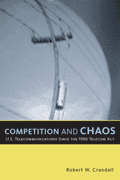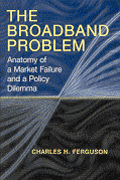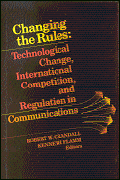Since 1971 competition has begun to replace regulation as a governing force in the telecommunications industry. The breakup of the national telephone monopolies, technological advances, and the worldwide network in telecommunications have brought a revolution in the telecommunications equipment and services industries. These changes have forced legislators and regulators to rethink public policy toward communications. The papers in this book were first presented at a conference organized by Robert Crandall and Kenneth Flamm, pulling together a group of industry professionals and scholars to address the far-reaching implications of the upheaval in the communications industry. The contributors analyze the effects of this increasing competition on standardization, technical innovation, and international rivalry. Changing the Rules offers possible policy options and analyzes their potential effects on the future market structure and the competitive positions of the U.S. computer and communications industries.
Related Books

Robert W. Crandall
April 26, 2005

Charles H. Ferguson
April 21, 2004
Authors
Edited by
Robert W. Crandall is a senior fellow in the Economic Studies program at the Brookings Institution, where his research has focused on telecommunications and cable television regulation, industrial organization and policy, and the changing regional structure of the U.S. economy. His previous books include Broadband: Should We Regulate Internet Access? (Brookings, 2002), Telecommunications Liberalization on Two Sides of the Atlantic (Brookings, 2001) and Who Pays for Universal Service? (Brookings, 2000). Kenneth Flamm is a senior fellow in Economic Studies and Foreign Policy Studies at the Brookings Institution.


